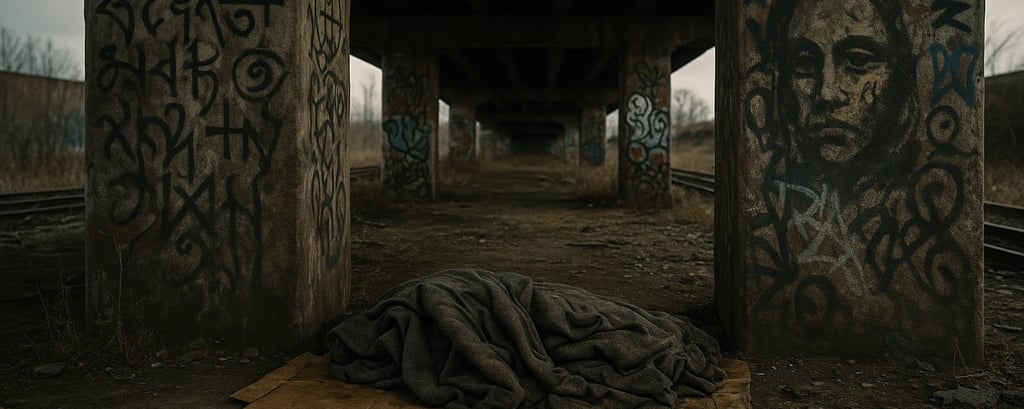The Indiana Exodus
I found my first bed under a bridge near an old rail yard. The concrete pillars were tattooed with names I couldn’t pronounce and faces scratched out by weather and rage. I built a nest of cardboard and wet blankets and learned to sleep with one eye open.
DARK RECESSES
Alan Dyer
8/8/20254 min read


The Indiana Exodus
"Home wasn’t home. It was a laboratory disguised as a chapel; a clown show taped over with hymns."
Backstory and Departure
I grew up in a two-room theological prison with wallpaper that smelled like monkey guts and communion wine. My dad wore two masks, a Methodist minister and a government biologist. The preacher part sermonized about purity; the scientist part tested poisons on creatures he despised. “You’re my little monkey,” he used to say, before explaining in full anatomical detail why monkeys deserved to die.
He was brilliant. Cruel. Hilarious in ways that broke teeth. I later learned brilliance often hides rot; trauma is a kind of genius, passed down like scripture no one asked to memorize.
Mom was raised by Irish nuns, emotionally cauterized before puberty. She said we could always ask for help, but the punishment came with public humiliation: the mailman, the butcher, the barber all got to play executioner when I stepped out of line.
And my brothers? Four of them. The third ran away and became a ghost. I sometimes whisper to him on long bus rides, like he’s listening from a static frequency in the void.
So, I left. Thumb out. Backpack stuffed with half a peanut butter sandwich and three secrets I hadn’t even told myself.
Journey to Indiana
The last thing I saw before I left was my dad’s Bible, flipped open to Revelation, coffee-stained, the pages bent like wings mid-collapse. I slipped out at dawn, wearing a thrift-store denim jacket and boots two sizes too big. I had no plan except to leave the place that felt more like a psychological experiment than a childhood.
I walked west for hours; past rusting playgrounds and motels built for adultery. The rhythm of my steps was like a silent hymn, each footfall a verse, each breath a confession.
A blue pickup truck, ancient and humming like it had secrets, pulled up beside me outside a gas station in Dayton. The driver was silent. Just nodded. I climbed in. That stretch of highway didn’t ask questions.
We passed forgotten factories, towns named after dead presidents, and churches that looked closed even on Sundays. As the sun dimmed behind truck stop neon, the driver dropped me at the edge of Gary, Indiana, a town that felt like the inside of a broken furnace. Steel ghosts lived here. People who forgot their names. I felt at home.
I arrived in Gary, Indiana, a place where buildings breathe in rust and cough out shadows. No one asked where I came from. They just showed me how to sleep where the cops wouldn't kick you and how to find food in dumpsters behind Walgreens. These weren’t friends. They were monks of the concrete monastery. And they taught me the discipline of survival.
Descent and Recognition
Drugs found me before I found a pillow. Violence came next. But I wasn’t a victim, I was auditioning for a role I didn’t even know I was born to play: the haunted one, the mirror held up to society’s worst intentions. My demons became my companions. They gave me rules, rituals, illusions. And I obeyed.
Yet… something stirred in me, like static behind my eyeballs. A forgotten line of scripture: “Whoever discovers the world and finds a corpse in it, is greater than the world.”
I had found the corpse. It was me.
I found my first bed under a bridge near an old rail yard. The concrete pillars were tattooed with names I couldn’t pronounce, and faces scratched out by weather and rage. I built a nest of cardboard and wet blankets and learned to sleep with one eye open.
There were others, bridge dwellers. A woman named Charlotte who spoke only in Shakespearean curses, a man who claimed he was an ex-CIA psychic, and another boy not much older than me who wouldn’t talk at all, just drew pictures in the dust.
They taught me the rules:
Never fight over food. Fight only over truth.
A cigarette, a meal, or a tip about where free food is being handed out, these small acts build trust and build friendship.
Don’t snitch, Stay out of other people’s business.
Theft from another homeless person can get you killed.
Never break a promise, it’s the only thing you have with value.
Street justice, someone breaks the rules, others enforce them. Always defend your friends.
Stay alert, especially at night or in unfamiliar groups. Know who your friends are.
Don’t set up camp too close to someone else unless invited.
Drugs arrived like angels of the underground, white dust, blue pills, amber liquids that turned panic into poetry. Violence came later. A bottle smashed across my temple for something I didn’t steal. Blood tastes metallic, but it smells like shame.
And yet, I began to write again. Scraps of paper, words scratched with charcoal or nail. “You are not your father’s ghost.” “Pain speaks louder when whispered.” “Resurrection isn’t a sunrise. It’s waking up next to rats and forgiving the stars.”
One night, with rain chewing the streets and the bridge groaning like it might finally collapse, I looked up and saw something, a void-shaped halo above the skyline. Or maybe I just imagined it.
But it felt like someone, or something, was watching. Not to save me. Just to see if I would survive long enough to become something holy.
Journal Fragment (Found Under the Bridge)
I don't know how long it's been.
The bridge is home now. The cold doesn’t sting anymore. I think I’ve become part of the architecture, like the sorrow carved into the concrete.
Today I watched a man chew his own fingers while praying to a pigeon.
Charlotte said madness is a baptism, if you lean into it.
I think my soul is molting. Or maybe I’m just hallucinating again.
Last night I dreamed of my third brother, the one who vanished. He was sleeping beside me, whispering in his sleep: “Keep going. There’s something in the sewer waiting to bless you.”
I woke up crying. First time in years.
Not sure if I cried for him, or for me.
Probably both.
info@billybeaner.com
480-366-3550 (Domain Sales)
© SDBEST LLC, 2025. All rights reserved.
